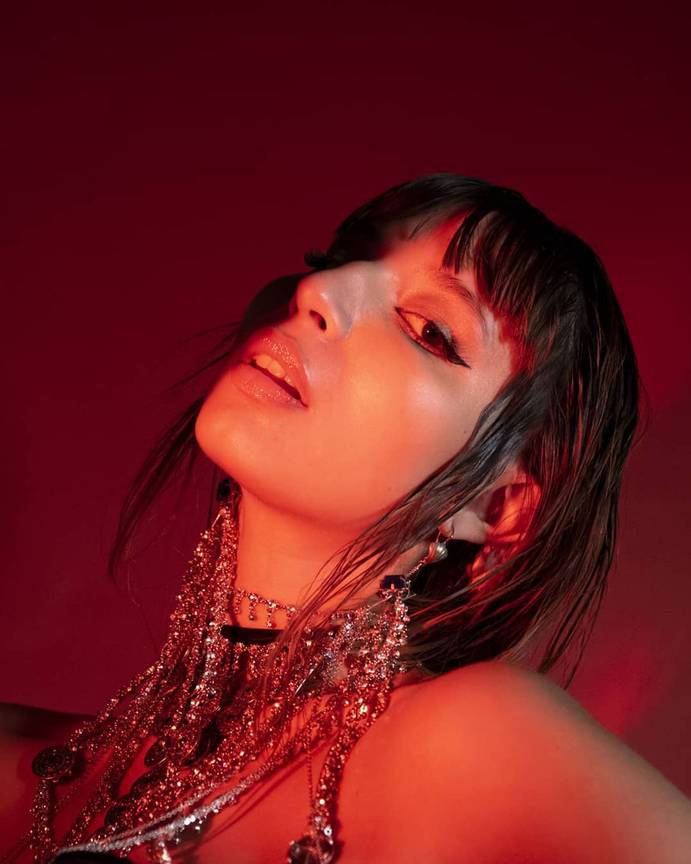You may know the Belgian-Bolivian singer Fabiola Legrain from The Voice Belgique. As Imaina, she is now releasing her debut EP Wounds, full of assertive electropop. “I sing about all aspects of toxic love, which prevents you from being yourself.”

Fabiola Legrain aka Imaina: “I love that everyone mixes languages in Brussels. It is a way of being.”
Imaina: 'I celebrate powerful women'
Fabiola Legrain came to Brussels at eighteen to study communication at IHECS, but taking part in The Voice Belgique and her subsequent transformation into Imaina really made her career take flight. Although she has always sung. “I took piano lessons at a young age, I put together shows to perform to my parents and was a member of several rock and punk bands in secondary school – I was already singing Metallica then, and more dramatic material like 'Bring Me To Life' by Evanescence. (Laughs) I also played in an acoustic duo with my brother: two voices and two guitars. We were very influenced by bossa nova and Latino music. By taking part in The Voice I realised that I wanted to be more than just that girl with her guitar. I found it too restrictive. I also really wanted to perform, to be involved in the production and visual aspect, being both cinematographic and emotional with my music, in short, growing to the next level.”
So Fabiola became Imaina. What is the difference between the two?
Fabiola Legrain: Fabiola is the traveller, the daughter, the family person. Imaina allows me to be super-crazy and limitlessly creative. She allowed me to become who I wanted to be. She gives me the freedom I mightn't have as Fabiola. Imaina means “how” in Quechua, the indigenous Bolivian language. I loved the sound and the meaning, but I was only completely convinced once my grandmother gave me her blessing. She speaks that language and also still lives in Potosí. It's one of the highest cities in the world at over 4,000 metres above sea level. The last time I visited her was four years ago, and certainly during this lockdown I have missed her. Luckily we often FaceTime and call each other.
You're pretty much on a bed of roses in Brussels with your background in different languages and cultures.
Legrain: (Enthusiastically) Absolutely. I sing in English and Spanish on my EP. Writing in different languages came naturally to me. In Bolivia we mix Spanish with Quechua, and I speak French at home with my Belgian father and Spanish with my Bolivian mother. I love that everyone mixes languages in Brussels, including on social media. It is a way of being. It's definitely in the DNA of children with parents of mixed backgrounds. Singing in Spanish also means everyone in Bolivia can understand me. My Spanish single “Piel Canela” has been picked up there through some local media and has become a modest hit on the radio. I have already appeared on TV there and will also soon be performing at an online festival.
I feel connected to the power and impertinence of witches
Your Facebook page says that in addition to being a singer-songwriter and performer you are also a “bruja”. How does that tie into the theme of your EP?
Legrain: Bruja means witch. The fact that witches used to be killed only because they wanted to be themselves fascinates me. I feel connected to their power and impertinence. On Wounds I sing about all aspects of toxic love, which mainly comes down to not being able to be yourself. The new single “Glass Box” for instance is about a woman trapped in her relationship. She is not loved for who she is. I tackle the Madonna-whore complex, the idea that we, as women, are expected to be a lot of different things at the same time. I play four different characters: the entertainer, the Virgin Mary, a doll and a self-confident high priestess. The latter is the wisest because she has learned from her mistakes. She realises that she doesn't have to please everyone all the time and doesn't have to sacrifice herself to experience true love. I recognise that romanticised ideal of sacrifice, fed by a sexist society, from a lot of Mexican and Brazilian telenovelas I watched in my youth.
You mentioned the Dutch-Iranian singer, Sevdaliza, who also has a very stylised look, as an inspiration, as well as the Brazilian-German singer-songwriter Dillon and Lana Del Rey, whose “High by the Beach” you recently covered. What do those inspirations for you have in common?
Legrain: Their overall sadness particularly inspires me. When I write I am attracted to those types of emotions. Visually I am influenced both by Bolivian folklore as well as say, Greek mythology, but even a painting in a museum can move me. I particularly enjoy finding female characters from old traditions and culture and making them my own. I love stories about demons and seducers, like Medusa. Just because powerful women are often presented as villains doesn't mean they are.
IMAINA: WOUNDS
EP release: 19/2, imainamusic.com
Read more about: Muziek